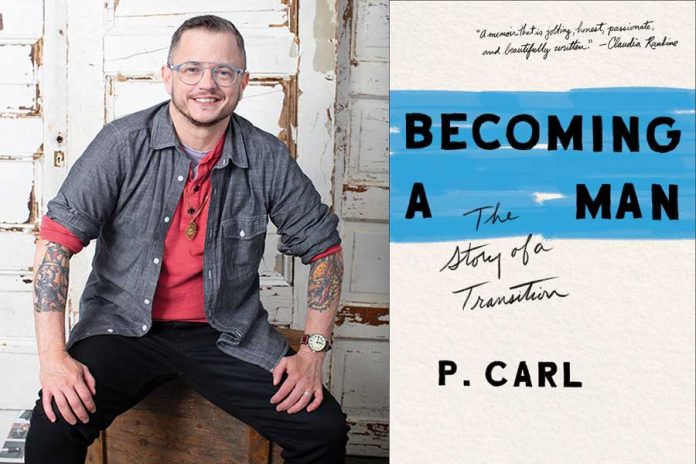P. Carl knew he was a boy at the age of four. It took a half-century for the rest of the world to catch up. “Becoming a Man,” Carl’s sharp and moving memoir about receiving gender confirmation at the age of 50, explores the liberation that comes with feeling at home in your own body for the first time in your life. It also reckons with embracing male identity in a culture that values toxic masculinity.
Having spent the first five decades of his life in a body that society gendered as female and visibly queer, Carl is acutely aware of the experiential divide he crosses when the world starts to see him as a man. The book’s first chapter recounts a business trip to New York six months after beginning testosterone therapy. The cis-male staff of Carl’s hotel regard him as a member of their fraternity — a development that both thrills and unsettles him. He sees how his maleness (and whiteness) engenders a privilege he’d never experienced before, a privilege he railed against before his transition, but uncomfortably enjoys now that he benefits from it.
As a man, Carl realizes he must reconcile the comfort he feels inhabiting his gender — the relief of just being one of the dudes, hanging out at barbershops and bars — and the awareness he gained at earlier points in his life. “This side of the binary suits me,” he writes. “But I can’t walk freely and act like I don’t know what women face in a culture of men who dismiss a woman’s terror and traumas and history as unworthy of consideration.”
In short, he must consider what it means to be a good man.
Carl equates transness with double consciousness, the term coined by W. E. B. Du Bois in “The Souls of Black Folk” to describe the way Black people understand their experience as members of an oppressive society. “I see all the flaws of men, all the ways their fragility makes them dangerous and powerful and dismissive and sure that they know it all, and I love being a man,” he writes. His use of “them,” rather than “we,” to describe men as a category is notable.
“Becoming a Man” also considers the personal implications of transition. Carl and his wife, writer Lynette D’Amico, had been together for nearly twenty years when he verbalized his desire to begin living openly as a man. Although D’Amico was aware of her partner’s gender dysphoria, this news was unsettling to a woman described as “an underground queer, a hard-ass femme who twirled butches around [her] finger.”
In “Becoming Me, Leaving You,” a chapter structured as an open letter to D’Amico, Carl writes with admirable frankness about the struggles the couple faced: “One thing we’ve had in common is our disdain for asshole white men. We love my white brothers. We adored your white father. We have some white male friends. But we’ve never had a white man in our bed. … You can barely touch me now. I sometimes grab your hands and rub them across my pecs, hoping that you will come to love them as much as I do. Will you? When will we know?”
Carl wrestles with other issues that might not be evident to readers who haven’t shared his experience. He chronicles losing friends — mostly cisgender and queer — who view his transition as an embrace of heterosexuality and patriarchy, regardless of his personal politics or need to be seen as his authentic self. He considers whether he can still think of himself as queer, especially when the world now reads his marriage to D’Amico as that of a middle-aged straight couple. When his personal trainer assumes he’s cis, he wonders whether it’s his duty to correct the error.
The memoir also deals with Carl’s relationship with his parents, which was fraught long before his decision to live as a man. Paradoxically, his chauvinistic, abusive father is better able to accept Carl’s transition than his mother, whose dementia causes her to confuse him with his brothers.
The sections that explore family trauma sometimes seem like they’d be more developed in a different memoir. This slim volume, just over 200 pages, could easily be two or more. Carl, who holds a Ph.D. from the University of Minnesota, occasionally devolves into writing in an overly academic, distanced style. The scholarly purple prose can stop the storytelling in its tracks, and attempts at comparative writing — like a chapter that heavily weaves examples from Tony Kushner’s “Angels in America” to Carl’s life — feel forced.
But the overall story, one of resilience and recognition after a lifetime of struggle, is one to celebrate. “Becoming a Man” reminds its reader of the importance of owning your narrative.
“Becoming a Man: The Story of a Transition” (Simon & Schuster, $26) is available wherever books are sold. P. Carl will read and speak at Labyrinth Books in Princeton, N.J., on March 24, and at Big Blue Marble Bookstore in Philadelphia on March 28.
